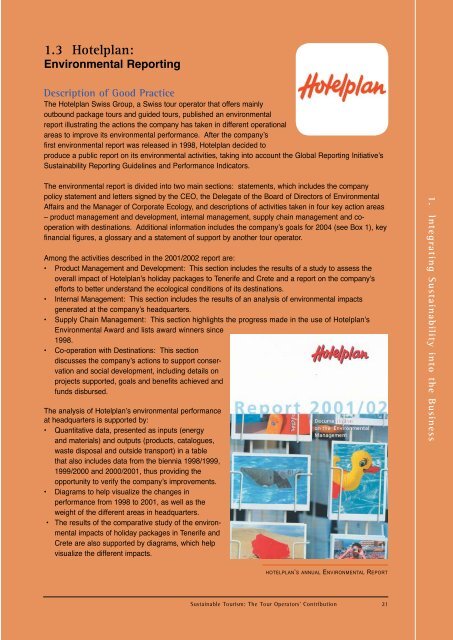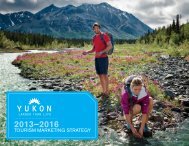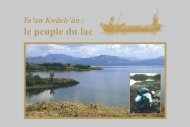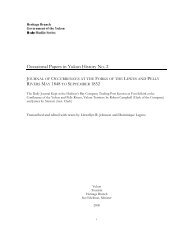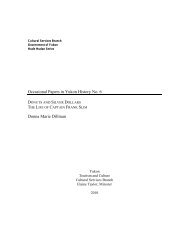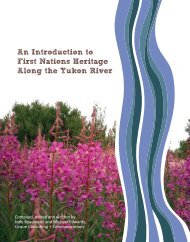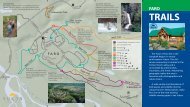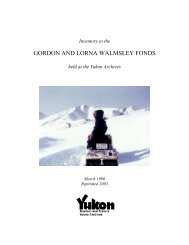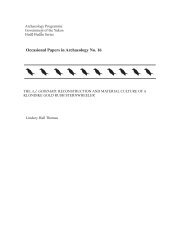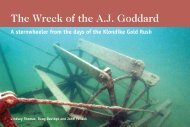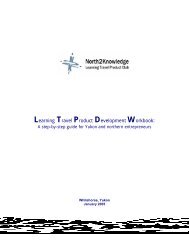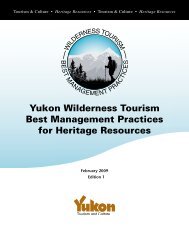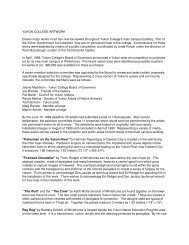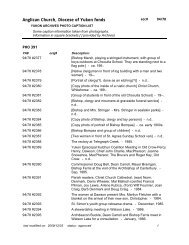Sustainable Tourism: The Tour Operators' Contribution
Sustainable Tourism: The Tour Operators' Contribution
Sustainable Tourism: The Tour Operators' Contribution
You also want an ePaper? Increase the reach of your titles
YUMPU automatically turns print PDFs into web optimized ePapers that Google loves.
1.3 Hotelplan:<br />
Environmental Reporting<br />
Description of Good Practice<br />
<strong>The</strong> Hotelplan Swiss Group, a Swiss tour operator that offers mainly<br />
outbound package tours and guided tours, published an environmental<br />
report illustrating the actions the company has taken in different operational<br />
areas to improve its environmental performance. After the company’s<br />
first environmental report was released in 1998, Hotelplan decided to<br />
produce a public report on its environmental activities, taking into account the Global Reporting Initiative’s<br />
Sustainability Reporting Guidelines and Performance Indicators.<br />
<strong>The</strong> environmental report is divided into two main sections: statements, which includes the company<br />
policy statement and letters signed by the CEO, the Delegate of the Board of Directors of Environmental<br />
Affairs and the Manager of Corporate Ecology, and descriptions of activities taken in four key action areas<br />
– product management and development, internal management, supply chain management and cooperation<br />
with destinations. Additional information includes the company’s goals for 2004 (see Box 1), key<br />
financial figures, a glossary and a statement of support by another tour operator.<br />
Among the activities described in the 2001/2002 report are:<br />
• Product Management and Development: This section includes the results of a study to assess the<br />
overall impact of Hotelplan’s holiday packages to Tenerife and Crete and a report on the company’s<br />
efforts to better understand the ecological conditions of its destinations.<br />
• Internal Management: This section includes the results of an analysis of environmental impacts<br />
generated at the company’s headquarters.<br />
• Supply Chain Management: This section highlights the progress made in the use of Hotelplan’s<br />
Environmental Award and lists award winners since<br />
1998.<br />
• Co-operation with Destinations: This section<br />
discusses the company’s actions to support conservation<br />
and social development, including details on<br />
projects supported, goals and benefits achieved and<br />
funds disbursed.<br />
<strong>The</strong> analysis of Hotelplan’s environmental performance<br />
at headquarters is supported by:<br />
• Quantitative data, presented as inputs (energy<br />
and materials) and outputs (products, catalogues,<br />
waste disposal and outside transport) in a table<br />
that also includes data from the biennia 1998/1999,<br />
1999/2000 and 2000/2001, thus providing the<br />
opportunity to verify the company’s improvements.<br />
• Diagrams to help visualize the changes in<br />
performance from 1998 to 2001, as well as the<br />
weight of the different areas in headquarters.<br />
• <strong>The</strong> results of the comparative study of the environmental<br />
impacts of holiday packages in Tenerife and<br />
Crete are also supported by diagrams, which help<br />
visualize the different impacts.<br />
hotelplaN’s aNNual eNviroNmeNtal report<br />
<strong>Sustainable</strong> <strong><strong>Tour</strong>ism</strong>: <strong>The</strong> <strong>Tour</strong> Operators’ <strong>Contribution</strong> 21<br />
1. Integrating Sustainability into the Business


